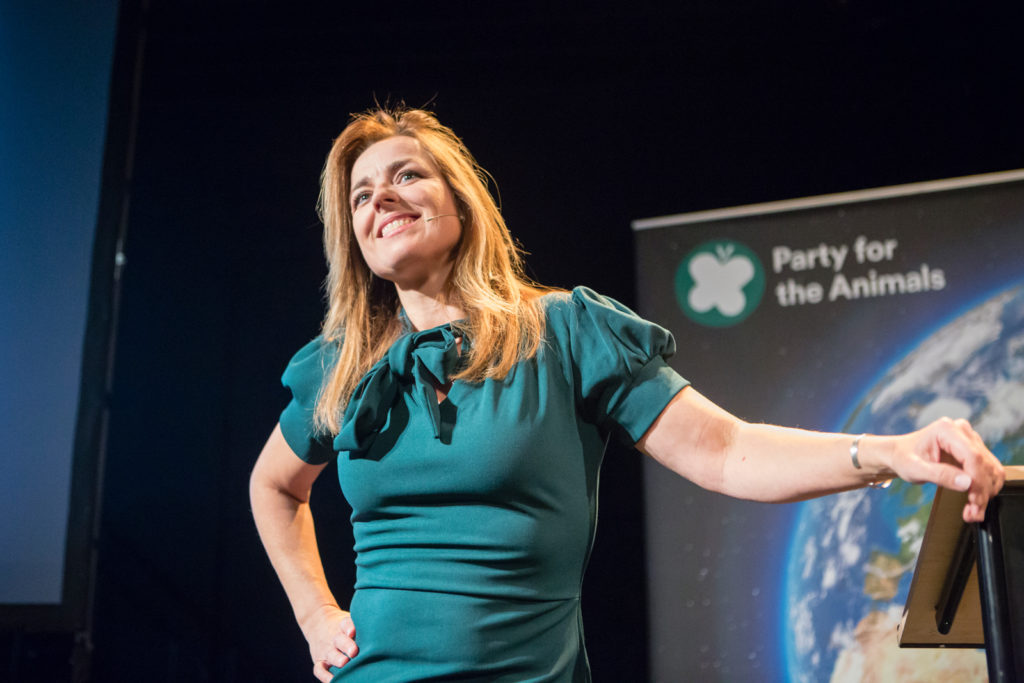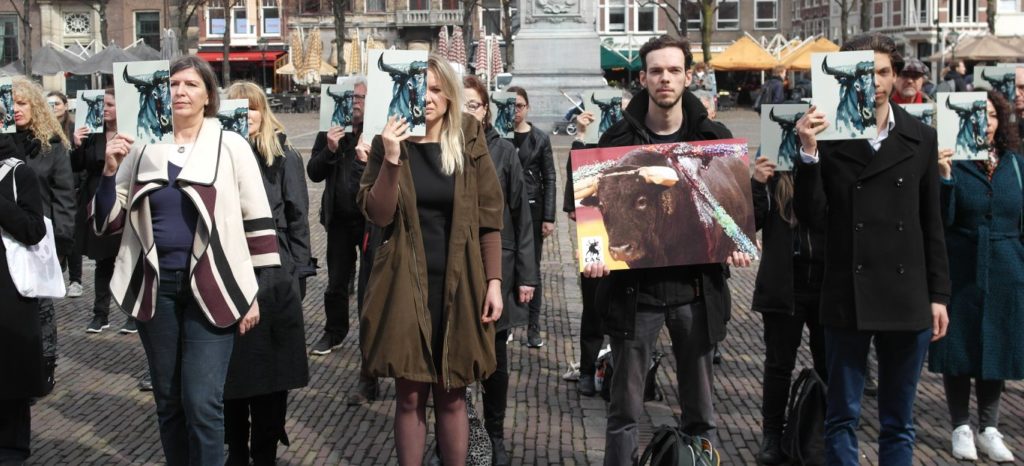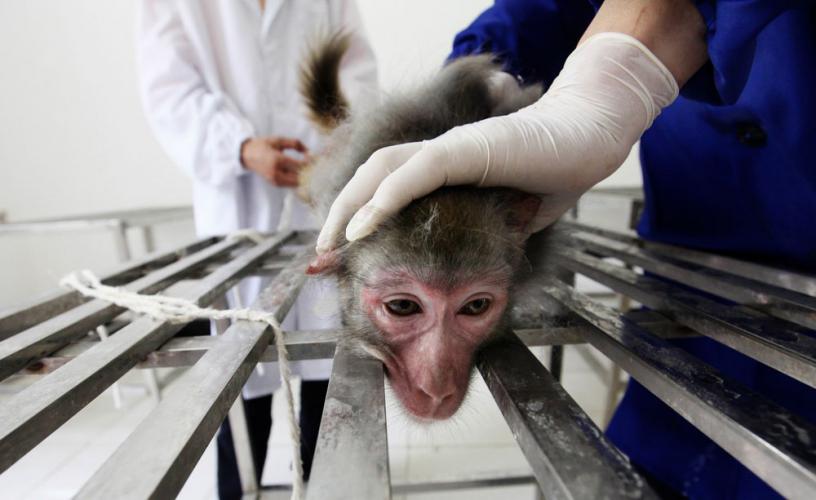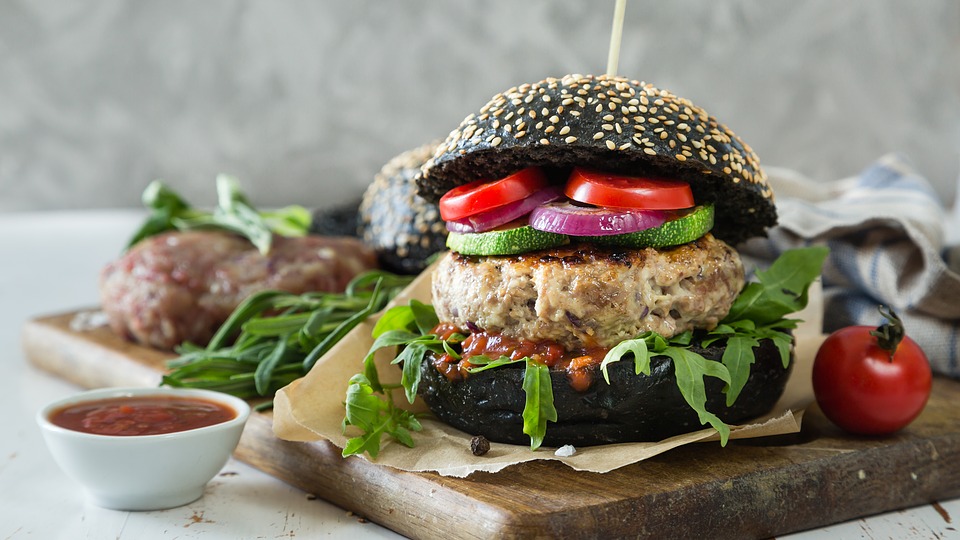Worldlog Marianne Thieme 1 mai 2018
The 22nd of April was International Earth Day. On that day, people all over the world reflect on all the beauty of the earth. Such a day demonstrates well that the problems surrounding nature, environment and climate change are transboundary and that we should collaborate to tackle these problems. I see that such awareness is growing, wherever I go. Just recently, I was in Sweden and Germany to give lectures. I was invited to Sweden by our sister party Djurens parti and to Germany by a theological university. The lecture in Germany was attended by visitors from Georgia, Hungary, the Czech Republic and Ghana among others. It’s wonderful to see that increasingly more people from different backgrounds are demanding a different kind of politics: politics focussed on sustainability and compassion instead of economic growth.

Marianne during her lecture in Sweden
Together we are in strong position: This is also demonstrated by the fight against bullfighting. Thanks to an international campaign conducted by CAS International, the European Parliament decided in 2015 that the European Union must stop its subsidies for bullfighting. The Dutch Lower House already accepted our motion to stop those subsidies in 2013. The European Commission has, however, ignored the wish of the European Parliament for years. But the EU subsidy policy is currently being reviewed, so there’s a chance again that the European Commission will decide not to invest any more money in the bullfighting industry. On the 4th of April, CAS International protested against the current European subsidies, opposite the Lower House, and our MEP Anja Hazekamp attended this protest, together with our member of the Lower House, Femke Merel Arissen. You, as a citizen, can also help to pressure European policy makers: sign the petition against the European subsidies for bullfighting here !

Femke Merel and Anja Hazekamp of the Party for the Animals at the protest against subsidies for bullfighting
The 24th of April was World Lab Animals Day. Worldwide, the number of animals that are used in animal testing is estimated at 115 million every year, of which 12 million animals are used in Europe. The Netherlands even has the largest Primate Testing Lab of Europe, the BPRC. 1500 monkeys are used there in gruesome experiments. Some monkeys get electrodes placed in their heads while others are made ill with the most horrifying diseases. We have drawn attention to what’s happening to those monkeys but also to the millions of other animals that are pointlessly used as testing animals all over the world. The Dutch government has said before that the Netherlands must be frontrunner in research without animal testing. So, it’s odd that an institute such as BPRC is still open.
Certainly, in these times of quick innovations and technological developments, there are sufficient alternatives for animal testing, but our governments refuse to invest enough money into them. We keep pressuring the government and the EU to stop the cruelties in the animal testing industry!

Experiments on monkeys
Almost half of all grains and vegetable proteins that are grown all over the world are fed to farming animals. What a waste of farming land, water and food that humans could eat directly. Our huge meat consumption is decadent. Even the most mainstream institutes and companies are now aware of this. The authoritative institute the World Food Organisation already sounded the alarm bell because the livestock industry poses a threat to our food security, nature and the environment. This month, the Council for the Living Environment and Infrastructure (an important advisory council of the Dutch government) adopted an urgent advice: the livestock industry must be considerably decreased to be able to achieve the Paris climate objectives and consumers must make their contributions too by consuming less meat and dairy products.

Vegan burger
But despite this scientific advice of its own advisory council, the Dutch government is hiding its head in the sand again and is ignoring the advice. The government’s intense lobbying this month even achieved that Dutch veal meat can be exported to China again. One of the most climate-, environmentally and animal-unfriendly measures a government can take. But fortunately, we see that others do dare to contribute to a positive change for humankind, animals and the environment. Increasingly more companies and educational institutes aim at local, organic and vegetable products. Read here the article of The Guardian about how veganism is becoming more mainstream.
Until the next time!
Marianne
Pe 22 aprilie am sărbătorit Ziua Internațională a Pământului. În această zi, oamenii din întreaga lume reflectă asupra frumuseții pământului. O zi ca aceasta arată într-adevăr că problemele în ceea ce privește natura și schimbarea climatică sunt mai presus de granițe și că trebuie să cooperăm pentru a le rezolva. Oriunde mă duc, văd cum gradul de conștientizare crește din ce în ce mai mult. Recent am fost în Suedia și Germania pentru a susține o prelegere. Am fost în Suedia la invitația partidului nostru soră, Djurens parti, și în Germania la invitația unei universități de teologie. La prelegerea din Germania au venit ascultători din țări precum Georgia, Ungaria, Republica Cehă și Ghana, printre altele. Este nemaipomenit să văd că sunt din ce în ce mai mulți oameni de diferite proveniențe care solicită un alt fel de politică: o politică concentrată pe durabilitate și compasiune, în loc de creștere economică.

Împreună suntem puternici: aceasta reiese și din lupta împotriva coridelor. Mulțumită unei campanii internaționale organizate de CAS International, Parlamentul European a decis ca în 2015, Uniunea Europeană nu va mai subvenționa coridele. Deja din 2013, Camera Deputaților din Țările de Jos a adoptat moțiunea noastră pentru a opri aceste subvenții. Totuși, Comisia Europeană a ignorat timp de ani de zile decizia Parlamentului European. În prezent, politica UE privind subvențiile este revizuită, ceea ce înseamnă că există din nou o șansă ca Comisia Europeană să se oprească cu adevărat din a mai finanța industria coridelor. Pe 4 aprilie, CAS International a protestat la Camera Deputaților în Haga împotriva subvențiilor europene din prezent, iar europarlamentarul nostru Anja Hazekamp a fost prezentă la acest protest, împreună cu Femke Merel Arissen, membru la camera deputaților. Și tu în calitate de cetățean poți ajuta la a pune mai multă presiune asupra factorilor legislativi europeni: semnează aici petiția împotriva subvențiilor europene care finanțează coridele!

Femke Merel și Anja Hazekamp din partea Partidului pentru Animale protestează împotriva subvențiilor pentru coride
Pe 24 aprilie sărbătorim Ziua mondială a protecției animalelor de laborator. La nivel global, numărul de animale folosite anual pentru experimente este estimat a fi la 155 milioane, dintre care 12 milioane doar în Europa. Mai mult decât atât, în Țările de Jos se găsește BPRC, cel mai mare centru de testare pe maimuțe din Europa. 1500 de maimuțe sunt folosite acolo în cadrul unor experimente groaznice. În capul maimuțelor se introduc electrozi și unele dintre animale sunt infestate în mod premeditat cu boli înspăimântătoare. Am atras atenția asupra sorții acestor maimuțe, însă și asupra faptului că milioane de alte animale de pe planetă sunt folosite orbește drept animale de experiment. Guvernul a declarat deja că până în 2025, Țările de Jos trebuie să fie liderul în cercetarea fără testare pe animale. Bineînțeles, este imposibil de explicat de ce există încă o instituție precum BPRC.
În special având în vedere că trăim într-o epocă care se bucură de un progres tehnologic și inovație rapidă, existând suficiente alternative pentru testarea pe animale. Totuși, guvernele noastre refuză să investească suficiente fonduri în aceste alternative. Continuăm să aplicăm presiune pe guvern și UE pentru a pune capăt atrocităților care au loc în industria testării pe animale!

Experimente pe maimuțe
Aproape jumătate din toată cantitatea globală de cereale și proteine vegetale este produsă drept hrană pentru animale. Ce risipă de pământ agricol, apă și mâncare pe care oamenii ar putea să o consume direct! Consumul nostru enorm de carne este astfel decadent. Acest lucru începe să aibă un impact până și asupra instituțiilor și companiilor mainstream. Institutul World Food Organisation a tras deja semnalul de alarmă fiindcă industria agricolă reprezintă o amenințare enormă pentru siguranța noastră alimentară, pentru natură și pentru mediul înconjurător. Luna aceasta, Consiliul pentru Mediu și Infrastructură (un consiliu consultativ important pentru guvernul neerlandez) a emis o opinie urgentă: populația de animale din crescătorii trebuie să fie redusă considerabil pentru a atinge obiectivele privind clima stabilite la Paris, iar consumatorii trebuie să contribuie prin a consuma mai puțină carne și produse lactate.

Burger vegan
În ciuda opiniilor științifice din partea propriului consiliu consultativ, guvernul neerlandez își îngroapă din nou capul în nisip și le ignoră. Prin lobby intens, luna aceasta guvernul s-a asigurat că carnea de vițel poate fi exportată din nou către China. O măsură dintre cele mai proaste pentru climă, mediu și animale pe care o poate lua un guvern. Din fericire, vedem că alții îndrăznesc să contribuie la o schimbare pozitivă pentru oameni, animale și mediul înconjurător. Din ce în ce mai multe companii și instituții educaționale se concentrează pe produse locale, organice și vegetale. Citește aici articolul The Guardian cu privire la modul în care veganismul devine din ce în ce mai mainstream.
Pe data viitoare!
Marianne